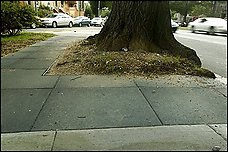
According to the AP, the District has invested $60,000 in buying sidewalks made from recycled tire rubber.
"The rubber squares are up to three times more expensive than concrete slabs but last longer, because tree roots and freezing weather won't crack them. That, in turn, could reduce the number of slip-and-fall lawsuits filed over uneven pavement.
"The shock-absorbing surface also happens to be easier on the joints of joggers, and more forgiving when someone takes a spill.
"And the rubber sidewalks are considered more environmentally friendly: They offer a way to recycle some of the estimated 290 million tires thrown out each year in the U.S., and they do not constrict tree roots the way concrete slabs do."
Has Arlington looked into rubber sidewalks? Here's a link to Rubbersidewalks.com.
